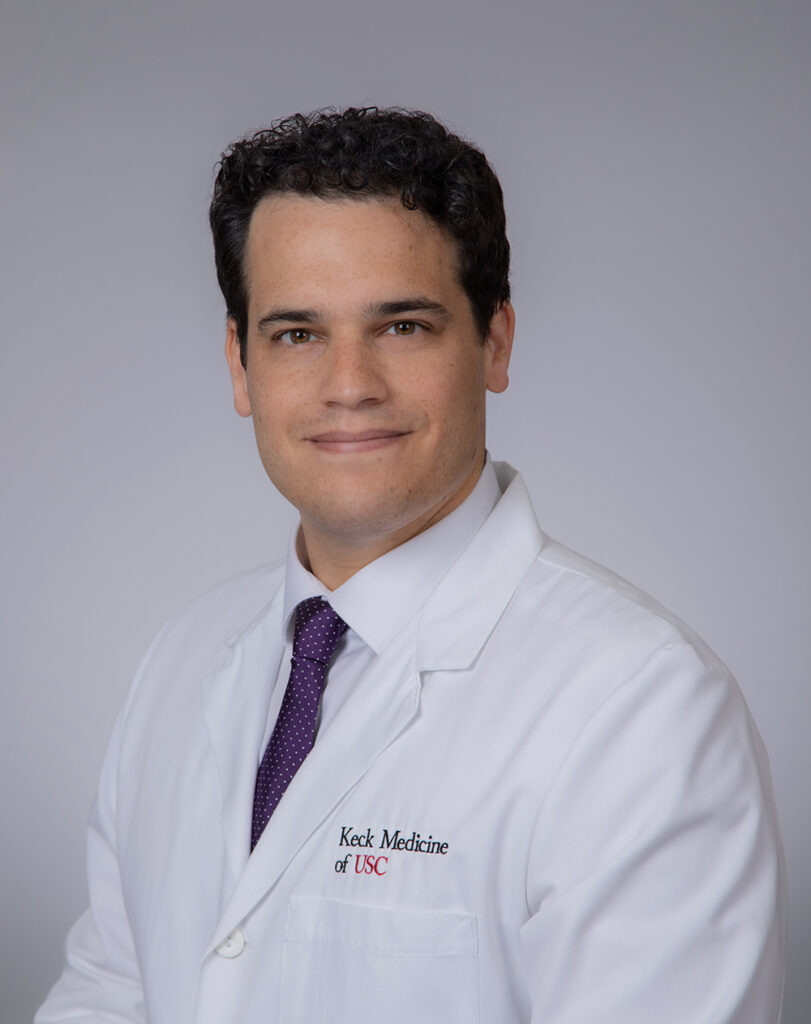
A Keck Medicine of USC urologist explains what AI can and can’t do in medicine…yet.
Artificial intelligence will permeate all reaches of health care in the coming years. But can AI ever replace most of what a human physician can do?
Mitchell Goldenberg, MBBS, PhD, a urologist with USC Urology, part of Keck Medicine of USC, explains the current capabilities and limits of AI.
AI can automate workflow.
Routine administrative tasks are prime candidates for AI.
“AI holds a lot of promise for automating and optimizing a lot of the day-to-day workflow tasks that doctors have to deal with,” Goldenberg explains. “Things like automatically identifying billing codes based on a doctor’s note, handling database work, translating clinical documents into different languages or using natural language processing to automate discussions.”
Some of this work is farmed out to scribes and data processors, but if AI can permanently remove these burdens from physicians’ shoulders, the benefits are vast.

AI can help physicians learn from past experience.
Physicians can evaluate their own clinical performance using AI. Scanning video footage, AI can document and track actions a surgeon performed, even ones the surgeon doesn’t remember or might have omitted from their own notes. “AI can identify missed details in surgical footage,” says Goldenberg.
AI can also identify gaps or differences. For instance, he says, using video footage, “AI can identify things a surgeon does differently than their colleagues that may lead to different outcomes.”
These applications are still in early development. “Some companies have begun collecting surgical videos and using AI models to evaluate surgeon performance,” Goldenberg says. “In terms of how much detail they can really provide surgeons, the feedback is still pretty minimal. But it’s a rapidly growing field, and there are a lot of different companies moving into the space, especially in robotic surgery.”
AI can support diagnostics.
One of the biggest topics is how AI can help doctors more accurately diagnose diseases.
“Most of the AI research in medicine is looking at how AI can aid in the diagnosis of different medical issues through radiology, pathology or clinical data,” Goldenberg says. “Can AI models evaluate large swaths of data and potentially narrow down the diagnosis — or even alert a physician’s attention to specific issues they might have missed, or any specific patterns in a patient’s data they may have overlooked? And can it help doctors predict outcomes based on that?”
Further down the line, based on large data sets, AI could predict whether a patient is likely to react adversely to a certain medication, or whether a patient may better handle a specific type of targeted therapy.
But is AI at the point now where it can independently diagnose a patient without physician help? “I don’t think it’s ready for prime time yet,” Goldenberg says.
AI and physicians: Partners in patient care
For now, the likeliest scenario is that physicians and AI will team up to improve the totality of patient care.
For instance, by drawing from large data sets, AI can help physicians account for all factors that could impact their patients’ health.
Goldenberg points out: “As doctors, we tend to focus on the disease state and symptoms a patient is describing. A huge, potentially unmet need is how AI can help us really understand the patient in front of us, their context and background. AI can bring to our attention the fact that a patient might do better with certain treatments than others based on their social supports, socioeconomic status and education — factors a doctor can’t necessarily ascertain in a 15-minute consult.”
Human physicians must also serve as a check for AI. Just as physicians have biases that can influence how they view, diagnose and treat diseases and patients, AI can be biased as well.
“AI models are only as good as the data they are trained on,” Goldenberg cautions. “Keep in mind that there are specific populations of patients who are not well represented in certain data sets, or that the data might be skewed by historical biases. Companies developing AI have a responsibility to make sure they’re training it on data representative of all patients and people from all backgrounds. As we collect more data and become more inclusive with the data we collect, the accuracy of these models will improve — and so will their day-to-day utility for doctors.”
It would be exciting to get to a point where AI can one day guide a surgeon performing a complex surgery, helping the surgeon make clinical decisions in real time. “But we haven’t really gotten to the point where AI can accurately identify, with individualistic precision, subtle differences in anatomical structures from patient to patient,” he adds. “As the doctor, I can recognize those surgical details. I know the patient’s history, the previous surgeries they’ve had and obstacles I might encounter. AI can’t really do that yet.”
He concludes: “I think what we’re looking for is not necessarily the perfect AI model that’s going to be 100% accurate but more AI technology that can help a physician make a diagnosis rather than replacing the doctor’s clinical decision making. At the end of the day, it’s a physician-patient relationship. I don’t think AI will ever replace the need for a human physician, but I think our ability to quickly, accurately and efficiently diagnose and treat a patient may be hugely improved with this sort of adjunct.”
Topics
